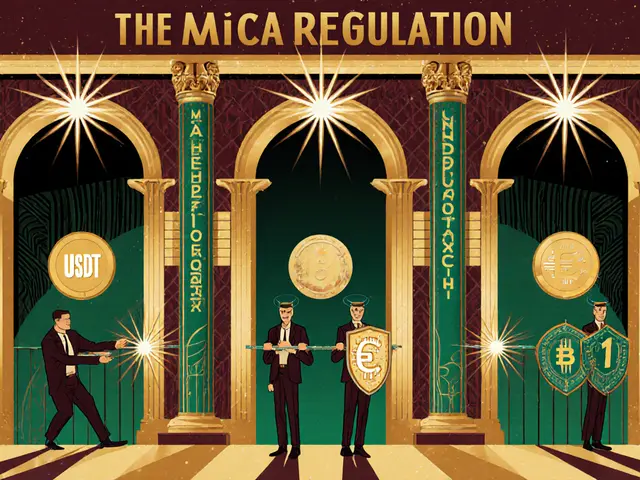Five years ago, if you asked a crypto company where to set up shop, the answer was often: anywhere but the U.S. Now, things are flipping. By 2025, the global crypto regulation landscape isn’t just changing-it’s being rebuilt from the ground up. Countries that once ignored digital assets are now racing to create clear rules. And the U.S., long seen as the biggest roadblock, is suddenly leading the charge toward clarity.
U.S. Regulation: From Chaos to Clarity
The biggest shift in 2025 isn’t happening in Europe or Asia-it’s in Washington, D.C. After years of regulatory ping-pong, where the SEC sued crypto firms one week and the CFTC said nothing was illegal the next, the new administration dropped the "regulation by enforcement" playbook. It’s over. No more surprise lawsuits. No more vague warnings. Instead, the government is writing rules that actually make sense. The Commodity Futures Trading Commission (CFTC) launched its "crypto sprint" in August 2025, a direct response to the President’s Working Group on Digital Asset Markets. Their goal? Make it legal and safe to trade spot crypto on regulated U.S. exchanges. For the first time, major crypto assets like Bitcoin and Ethereum could trade on CFTC-registered futures exchanges. That’s huge. It means institutional investors-pension funds, hedge funds, banks-can finally enter the market without worrying about legal gray zones. Even more surprising? The SEC under Chair Atkins declared that most crypto assets are not securities. That’s a full 180 from the previous administration, which treated every token like a stock. This change alone removes legal uncertainty for thousands of projects. If you’re building a blockchain app and issuing a token, you no longer need to hire a team of securities lawyers just to launch. The Stablecoin Trust Act is on track to pass in late 2025. It will require every stablecoin issuer-whether it’s Tether, Circle, or a startup in Austin-to hold 100% reserves in cash or short-term U.S. Treasuries. Those reserves must be held separately from company funds and audited monthly by the Federal Reserve or OCC. No more hidden loans. No more risky investments. Just clean, transparent backing. And the FIT Act? It’s the blueprint for how U.S. regulators will split the pie. The SEC gets control over tokens that act like stocks-think profit-sharing tokens or investment contracts. The CFTC handles everything else: Bitcoin, Ethereum, and most utility tokens. No more jurisdictional wars. No more companies getting sued by two agencies at once.Asia’s Quiet Power Play
While the U.S. was stuck in political gridlock, Asia quietly built the most advanced crypto frameworks in the world. Hong Kong and Singapore aren’t just welcoming crypto-they’re betting their financial futures on it. Hong Kong launched its licensing regime in early 2025, requiring all exchanges, custody providers, and over-the-counter desks to get government approval. They’re also drafting rules for crypto derivatives and lending platforms, making sure leverage doesn’t spiral out of control. What’s unique? They’re not just copying the U.S. or EU. They’re building systems that work for retail traders in Asia-where millions buy crypto with their phones, not their brokerage accounts. Singapore took it further. They’ve already finalized their stablecoin rules and now require every crypto firm to prove they’re financially sound before they can operate. But they also offer fast-track licenses for startups that use blockchain for real-world use cases-like supply chain tracking or tokenized real estate. That’s not regulation for the sake of control. That’s regulation to attract innovation. These two hubs are competing to become the go-to place for crypto startups in Asia. And it’s working. In 2024, over 60% of new crypto funding in Asia flowed into companies based in Hong Kong or Singapore. That’s not luck. That’s policy.The EU’s Slow-Moving Train
The European Union’s Markets in Crypto-Assets Regulation (MiCAR) was supposed to be the gold standard. But by 2025, it’s become a cautionary tale. MiCAR took five years to draft and another two to implement. Now, firms are stuck in a gray zone: they’re legally required to comply, but the final guidelines are still being written. Banks in Germany can’t offer crypto custody. Exchanges in France can’t list new tokens. Startups in Spain are delaying launches because they don’t know what’s allowed. The problem? MiCAR was designed by bureaucrats, not builders. It treats Bitcoin the same way it treats a DeFi lending protocol. It doesn’t account for the difference between a digital coin and a smart contract platform. And it’s forcing every crypto firm in the EU to follow the same rigid rules-no matter their size or purpose. Still, MiCAR did get one thing right: it forced every EU country to adopt the same standards. No more Switzerland letting crypto firms operate while France shuts them down. That’s progress-even if it’s slow.
Emerging Markets: Catching Up Fast
You don’t have to be a financial powerhouse to regulate crypto. Countries like Bahrain, South Africa, Nigeria, and the UAE are proving that. Bahrain’s central bank started issuing licenses to crypto firms in 2023. By 2025, they’ve approved over 40 companies, including major U.S.-based exchanges that moved their operations there to serve the Middle East and Africa. Their rules are simple: prove you’re secure, prove you’re transparent, and you can operate. South Africa’s Financial Sector Conduct Authority (FSCA) launched a licensing system in early 2025. They don’t ban crypto-they regulate it. Exchanges must verify users, report suspicious activity, and keep customer funds separate. The result? Crypto adoption in South Africa has doubled since 2023, not because people are ignoring regulation, but because they trust it now. Even Nigeria, once one of the most hostile countries toward crypto, reversed its ban in 2024. Today, they’re working with the Central Bank to create a digital asset sandbox where startups can test products under supervision. Why? Because 30% of Nigerian adults now own crypto-and they’re not going away.Why the Industry Changed Its Mind
Here’s the wild part: crypto companies used to hate regulation. They called it censorship. They said it would kill innovation. That changed after FTX collapsed in 2022. Suddenly, the public blamed crypto-not fraudsters. The industry realized: if they didn’t fix their own house, governments would smash it down. By 2024, crypto firms were spending millions lobbying for clear rules. They hired former regulators. They wrote policy papers. They showed up at hearings. And they didn’t just ask for leniency-they offered solutions. That’s why the U.S. passed the Stablecoin Trust Act and why the SEC changed its stance. Senior counsel Melissa Hall, who helped build the first crypto bank, says it best: "The industry went from fighting regulators to sitting at the table with them." That’s not a win for regulators. That’s a win for the entire ecosystem.
What’s Next? The Big Questions in 2025
We’re not done yet. Three big questions remain:- Will the U.S. finally pick one primary regulator? Right now, you need to talk to both the SEC and CFTC. That’s confusing. Some experts think Congress will create a new Digital Asset Agency by 2026.
- Will the SEC stick to its new hands-off approach? Or will they quietly start suing again once the political spotlight fades?
- Can the EU fix MiCAR before it drives more firms out of Europe? Right now, firms are moving to Singapore, Dubai, and even Canada-not because they want to, but because they have to.
What This Means for You
If you’re a crypto user: your assets are safer than ever. Stablecoins are backed by real cash. Exchanges are licensed. Fraudsters are getting caught. If you’re a developer: you can build without fear. Clear rules mean you can raise funding, hire talent, and scale. If you’re an investor: you finally have transparency. No more guessing if a token is a security. No more wondering if your exchange is legit. The era of "crypto wild west" is over. The new era? It’s not about banning crypto. It’s about making it work-for everyone.Is crypto legal in the U.S. in 2025?
Yes, crypto is fully legal in the U.S. in 2025. The key change is that it’s now regulated under clear rules. The CFTC oversees Bitcoin and Ethereum as commodities, while the SEC only regulates tokens that function like securities. Exchanges must be licensed, stablecoins must be fully backed, and all firms must follow anti-money laundering rules.
Which countries have the best crypto regulations?
As of 2025, Hong Kong and Singapore lead in practical, innovation-friendly regulation. They offer clear licensing, protect investors, and actively attract blockchain startups. The U.S. is catching up fast with its new CFTC-SEC framework and stablecoin laws. The EU’s MiCAR is comprehensive but too slow and rigid. Emerging markets like Bahrain and South Africa are proving that even smaller economies can build effective systems.
Are stablecoins safe now?
Much safer. The U.S. Stablecoin Trust Act requires all issuers to hold 100% reserves in cash or U.S. Treasuries, keep those funds separate from company assets, and submit monthly audits overseen by the Federal Reserve or OCC. This eliminates the risk of hidden investments or loan defaults that caused TerraUSD’s collapse in 2022. Only issuers meeting these standards can operate legally.
Why did the SEC change its mind about crypto?
The SEC changed its stance because the industry proved that most crypto assets don’t meet the legal definition of a security. Bitcoin and Ethereum aren’t sold as investments in a company-they’re used as digital money or network utilities. After years of lawsuits and court losses, the SEC realized it was misapplying securities laws. Under Chair Atkins, they shifted to a rule-based approach, focusing only on tokens that promise profits from others’ efforts-like early-stage ICOs.
Will crypto regulation hurt innovation?
No-the opposite. Regulation killed innovation when it was chaotic and unpredictable. Now that rules are clear, companies can build with confidence. Startups can raise venture capital. Banks can offer crypto services. Developers know what’s allowed. The biggest threat to innovation isn’t regulation-it’s uncertainty. And in 2025, that uncertainty is finally fading.




Sunidhi Arakere
November 4, 2025 AT 22:22Crypto regulation is finally making sense. No more chaos. Just clear rules. That’s all we ever wanted.
Simple. Clean. Practical.
Vivian Efthimiopoulou
November 5, 2025 AT 21:43This is not merely regulatory evolution-it is a moral recalibration of financial sovereignty.
For decades, the crypto community operated in the shadows, not out of rebellion, but out of necessity. The state, in its bureaucratic inertia, mistook decentralization for lawlessness.
But now, we witness the quiet triumph of pragmatism over ideology. The SEC’s pivot is not surrender-it is enlightenment.
When institutions begin to see Bitcoin not as a threat to the dollar, but as a digital reserve asset, we have crossed a threshold.
Stablecoins backed by Treasuries? That is not regulation. That is monetary integrity.
The EU’s MiCAR? A monument to over-engineering. A cathedral built on sand.
Meanwhile, Singapore and Hong Kong-small, agile, visionary-have understood that regulation is not a cage, but a bridge.
And let us not forget: this transformation was not gifted by politicians. It was forged by developers, entrepreneurs, and ordinary citizens who refused to be silenced.
This is the quiet revolution. No banners. No riots. Just code, compliance, and conviction.
The future does not belong to the loudest. It belongs to the most responsible.
And for the first time in a decade, I believe we are becoming responsible.
Not perfect. Not finished. But moving-deliberately, wisely-toward something enduring.
Let us not squander this moment.
Let us build with care.
And let us never forget: the blockchain was never meant to replace the state. It was meant to make the state better.
Angie Martin-Schwarze
November 6, 2025 AT 17:00ok but like… why does the sec even exist if they kept changing their mind??
also i think the us is just doing this so they dont lose all the crypto biz to singapore 😭
also who even reads these laws?? i just wanna buy shiba inu
Fred Kärblane
November 7, 2025 AT 12:51Big win for the ecosystem. CFTC taking the lead on spot BTC/ETH? That’s the infrastructure play we needed.
Stablecoin trust act = game changer. 100% reserves + Fed audits? That’s institutional-grade transparency.
And the FIT Act finally resolving jurisdictional overlap? Finally. No more dual enforcement nightmares.
Now we can scale. Now we can integrate. Now we can move from speculation to utility.
This isn’t just regulation-it’s onboarding the entire financial world. And it’s happening faster than anyone predicted.
DeFi, tokenized real estate, CBDC interoperability-all of it just got a massive boost.
The real winners? Retail investors who finally have a safe on-ramp. And devs who can build without legal FUD.
This is the foundation. Now let’s build the future.
Janna Preston
November 7, 2025 AT 15:59I still don’t get why the SEC changed their mind. Was it just because they kept losing in court?
Also, what about all the tokens that were already labeled securities? Are they just… forgiven now?
And what counts as a ‘security’ now? Is it just about whether it promises profits? That seems kinda vague still.
Also, who audits the auditors? Like, if the Fed is checking the stablecoin reserves, who checks the Fed?
I’m not against regulation, I just want to know it’s not just swapping one kind of chaos for another.
Meagan Wristen
November 7, 2025 AT 16:31I just want to say how proud I am of where this industry has come from.
From the wild west days of 2017, when people were buying Dogecoin because it was funny, to now-where governments are sitting down with builders and actually listening.
It’s not perfect, but it’s progress.
And it’s because of people like you-developers, small business owners, everyday crypto users-who kept showing up, kept building, kept believing.
I’ve seen friends lose everything in FTX. I’ve seen family members scared to even ask what blockchain is.
But now? Now there’s hope.
Not the hype kind. The quiet, steady kind.
And I’m so glad we’re getting there together.
Becca Robins
November 9, 2025 AT 16:04so the us is regulating now? lmao
first they tried to shut us down, now they wanna tax us? 😭
also who even uses treasuries?? i thought crypto was about being unbanked??
also can i still meme coin my rent?? 🤔
Alexa Huffman
November 10, 2025 AT 18:35The shift in U.S. policy is one of the most significant developments in financial history this decade.
What’s remarkable is not just the clarity of the rules, but the willingness of regulators to listen.
For years, crypto was treated like a fad. Now, it’s being treated like infrastructure.
The Stablecoin Trust Act, in particular, is a masterstroke-it removes the most dangerous vector of systemic risk without stifling innovation.
And the division of authority between the CFTC and SEC? Long overdue.
This isn’t just about compliance. It’s about legitimacy.
And legitimacy, in finance, is the foundation of trust.
Thank you to everyone who pushed for this-not just the lobbyists, but the everyday users who showed up at hearings, wrote letters, and kept building.
We’re not done yet. But we’re finally on the right path.
gerald buddiman
November 11, 2025 AT 15:41Wait-so the SEC actually admitted they were wrong? After all those lawsuits? After all the fear-mongering? After all the people who lost their life savings because of their inconsistent rulings?
And now they’re saying Bitcoin isn’t a security? Really?
What about all the people who bought tokens thinking they were buying into a company? Are they just… out of luck?
And why now? Why not two years ago when it would’ve actually helped?
It feels less like reform and more like damage control.
But… I’ll take it. I just hope they don’t backtrack again.
And if they do? I’m moving my whole portfolio to Singapore.
And I’m not even joking.
Arjun Ullas
November 12, 2025 AT 20:36Regulation is not a threat to innovation-it is the scaffolding upon which true innovation is built.
Without clear rules, capital flees. Talent disperses. Projects die before they begin.
The U.S. has awakened to this truth. Hong Kong and Singapore have demonstrated it for years.
But let us be clear: this is not charity. It is strategic necessity.
India, too, must move swiftly. We have millions of young innovators, eager to build, but held back by ambiguity.
Let us not wait for a collapse to act.
Let us learn from the mistakes of others.
Let us craft rules that are firm, fair, and forward-looking.
The blockchain is not foreign to us.
It is ours to shape.
And we must do so with wisdom, not fear.
Steven Lam
November 13, 2025 AT 11:31Regulation? Please. This is just the government trying to control money again
Bitcoin was supposed to be free from banks and bureaucrats
Now they’re putting it in a cage and calling it progress
Typical. Always the same story
They take the thing that’s free and make it expensive and slow
And then they pat themselves on the back
Good job guys
You ruined it again
Noah Roelofsn
November 14, 2025 AT 19:13This is the most elegant regulatory architecture crypto has ever seen.
Not because it’s perfect-but because it’s *adaptive*. The FIT Act doesn’t try to force Bitcoin into a securities box. It recognizes that not all digital assets are created equal.
The CFTC handling spot BTC/ETH as commodities? Brilliant. They’ve got the tools for market integrity, price manipulation, and futures oversight.
And the SEC focusing only on profit-driven tokens? Finally. They’re applying Howey Test logic with precision, not a sledgehammer.
Stablecoin rules? Clean. Transparent. Unassailable.
And the fact that emerging markets like Bahrain and Nigeria are leapfrogging the EU? That’s the real story.
Regulation isn’t about size. It’s about vision.
These aren’t just rules-they’re blueprints for a new financial order.
And guess what? It’s being written by people who actually understand technology.
That’s the revolution.
Sierra Rustami
November 15, 2025 AT 13:10U.S. leading? Please. We’re just copying Singapore because we’re scared.
Europe is weak. India is behind. China banned it.
So now we’re pretending we’re the good guys?
Big government always wants control.
They’ll tax us, track us, and then say ‘we saved crypto’.
Don’t believe the hype.
This is just another power grab.
Glen Meyer
November 17, 2025 AT 12:05Let’s be real-this whole thing is just the U.S. trying to keep crypto from leaving.
They didn’t care until they saw Singapore getting all the startups.
Now they’re throwing money at regulators to write nice-sounding rules.
But mark my words-five years from now, they’ll be back to suing people.
They always are.
And when they do? I’ll be in Dubai with my Bitcoin.
And I’ll be laughing.
Christopher Evans
November 19, 2025 AT 04:22The evolution of crypto regulation reflects a broader maturation of digital finance.
It is no longer a fringe experiment. It is an integral component of global monetary systems.
The clarity provided by the CFTC-SEC division of labor, the enforceable standards for stablecoins, and the structured licensing frameworks in Asia demonstrate a collective recognition of responsibility.
Regulation, when thoughtfully designed, does not stifle innovation-it enables it by reducing uncertainty.
This is not a surrender to authority.
It is a recognition that trust, in financial systems, must be earned, not assumed.
Thank you to the policymakers who listened.
And to the builders who refused to quit.
Ryan McCarthy
November 20, 2025 AT 18:40I think this is actually really hopeful.
For so long, it felt like crypto was stuck between two worlds-too radical for the old system, too messy for the new.
But now? People are sitting down. Talking. Building together.
It’s not perfect. There are still gaps.
But for the first time, it feels like we’re moving in the same direction.
And that matters.
Because this isn’t just about money.
It’s about who gets to participate.
And now, more people than ever before might actually get a seat at the table.
Abelard Rocker
November 21, 2025 AT 20:44Oh, so now the U.S. is the hero? After five years of suing every startup that dared to say ‘decentralized’? After the FTX collapse, when the SEC was still pretending they didn’t know what was going on? Now they’re the ‘clear regulators’? Please.
Let’s not pretend this is altruism. This is panic. This is fear. This is the U.S. government realizing that if they don’t get their act together, the entire crypto economy will relocate to Dubai, Singapore, or even Switzerland-and then they’ll be left with nothing but a bunch of confused bureaucrats holding a press conference in a half-empty room.
And don’t get me started on MiCAR-five years to draft a law that treats Bitcoin the same as a meme token? That’s not regulation. That’s a farce written by people who think ‘blockchain’ is a type of yogurt.
And the SEC? They’ve changed their mind because they lost every court case. Not because they suddenly understood the technology. Because they got embarrassed.
So now they’re putting on a suit and calling it ‘clarity’.
But we know the truth.
They didn’t change.
We did.
And they’re just trying to catch up before we leave them behind for good.
So congratulations, Washington.
You’re not leading.
You’re chasing.
And we’re still ahead.
Hope Aubrey
November 23, 2025 AT 03:27Ok but the U.S. is still the only country that treats crypto like a weapon.
Now they’re regulating it so they can tax it better?
And why do they think they get to decide what’s a security?
What about all the people who lost money because the SEC kept changing its mind?
And why is everyone acting like this is a win?
It’s just the government trying to control the narrative again.
They don’t want crypto to be free.
They want it to be theirs.
And I’m not buying it.
Not this time.
andrew seeby
November 24, 2025 AT 23:52finally some sane rules 😅
stablecoins backed by treasuries? yes please.
no more terra crashes.
also cftc handling btc/eth? perfect.
us is actually doing something right for once 🤫
also singapore is flexing hard 😎
Pranjali Dattatraya Upadhye
November 26, 2025 AT 21:23This is beautiful-real, grounded progress.
Not flashy, not dramatic-but deeply meaningful.
For years, we were told regulation meant death for crypto.
But here’s the truth: regulation without clarity is chaos.
And chaos kills innovation faster than any law ever could.
Now, for the first time, a developer in Delhi, a startup in Lagos, a trader in Nairobi-they can look at the rules and know what’s allowed.
That’s power.
That’s dignity.
That’s what freedom looks like when it’s not just rebellion-but responsibility.
The U.S. didn’t become a leader by being the loudest.
They became a leader by finally listening.
And the rest of the world? We’re watching.
And we’re learning.
Because this isn’t just about crypto.
It’s about how we build systems that serve people-not just profits.
And for that? I’m truly grateful.
Vivian Efthimiopoulou
November 28, 2025 AT 20:54Your observation about the SEC’s reversal being rooted in legal defeats is not merely accurate-it is profoundly insightful.
Regulation, when born of litigation rather than foresight, is always reactive-and therefore fragile.
But the fact that this shift has been codified into statute-the Stablecoin Trust Act, the FIT Act-is what gives it weight.
It is no longer a whim. It is a framework.
And frameworks, once established, are far harder to dismantle.
That is the true victory.
Not the change in policy-but the permanence of the structure.
Now, the burden of proof lies with those who would undo it.
And that, perhaps, is the most powerful form of protection we could have hoped for.